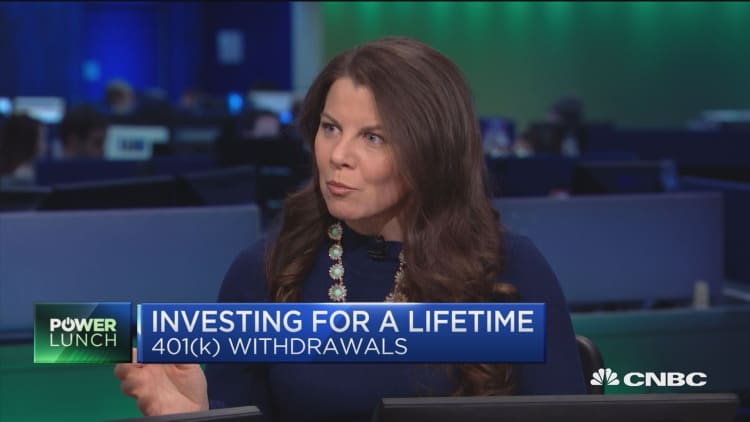When you start earning steady income, it can feel as momentous as going from crawling to walking. You might be able to afford to dine at a restaurant you previously couldn't, or maybe you can finally pay your bills on time or consider renting an apartment that better suits you.
As these new possibilities present themselves, remember that it's also a great time to position yourself for long-term financial security.
"To me, money equals choices," said Kathryn Hauer, a certified financial planner with Wilson David Investment Advisors. "If you focus on the idea that money lets you make choices that make your life better, it's a good way to encourage yourself to do things now for your future self."
Of course, everyone's situation is different. Some people get going in their work life with well-paying salaries, or free of student loan debt and few financial obligations. Others face more challenging situations, whether due to debt or other hurdles that make it tricky to set aside money for future reasons.
Additionally, setting up a budget and then sticking to it isn't always easy. Nor will you see results of your savings efforts overnight, which means you have to exercise some patience.
And, because everyone's goals — and how they get prioritized — are different, it's important that you look inward before doing much of anything.
"Otherwise you're just shooting from the hip," said CFP Douglas Boneparth, president of Bone Fide Wealth.
To me, money equals choices.Kathryn HauerCertified financial planner with Wilson David Investment Advisors
First, Boneparth said, you should identify your goals. They might include shorter-term objectives like a vacation or longer-term ones like a comfortable retirement.
Once you identify your goals, you should quantify them — that is, figure out how much those things will cost, Boneparth said. Then, you need to prioritize.
"I think this is often the most important step," Boneparth said. "Most people do not have the financial resources to fund all of their goals at once."
The idea of funding both short- and long-term goals might sound like a high-wire balancing act that involves some sacrifice. Yet the sooner you get started on identifying them and working toward them, the higher the payoff down the road.
Here are some smart money moves that can help build a solid financial foundation for the future, regardless of your particular goals.
Set up emergency savings
Many people don't have emergency money set aside, despite experts typically recommending building up three to six months' worth of living expenses in a savings account.
In fact, 40 percent of Americans wouldn't be able to cover an unexpected $400 expense without selling something or borrowing money, according to a 2018 Federal Reserve survey.
"My personal take is that having an emergency fund of some kind should be a priority," Boneparth said.
One reason for such savings is that the options for funding unanticipated expenses can be pricey.
For instance, the average interest rate on credit cards has reached 17.5 percent, according to CreditCards.com.
Cash advances from credit cards typically come with even higher rates — the average is about 21 percent, according to WalletHub. Likewise, a payday loan can come with steep costs as well — not to mention payment is expected in full by your next paycheck. Even if you could qualify for a lower-cost option, it nevertheless would be yet another financial obligation.
And, if you have no emergency fund but are saving for retirement through a 401(k) plan or similar tax-advantaged option, you might be more likely to raid that account if someday you hit a financial setback.
Experts generally say this is a big no-no. For starters, you remove not only money you had earmarked for retirement, but also all the earnings your money would have generated if it had stayed put.
Also, if you tap those funds before age 59½, you could face a 10 percent penalty for the withdrawal on top of paying taxes on it).
More from Invest In You:
Here's how to figure out your net worth
Five ways to get the most out of your awesome raise
Got debt? Your boss wants to help with that
Save for your golden years
For long-term financial security, it's important to think about the eventual time when full-time work is behind you, whether you choose to call that phase of life retirement or not.
While Social Security provides retirees with some income and is expected to continue existing in one form or another well into the future, it often isn't enough to cover all expenses. And if you won't have a pension — most workers today do not — your own savings will help provide you with income when you need it.
Exactly how much you should put toward that nest egg depends on a variety of factors, including your competing financial goals or obligations.

However, if you have a 401(k) or similar tax-advantaged retirement account through work, many experts recommend putting in at least enough to get the company match, which might be $1 for every $1 you put in (or, say, 50 cents for every $1) up to a certain amount.
"If you can put in enough to get the match, do it," Hauer said. "Otherwise, it's essentially free money that you leave on the table."
The 2019 contribution limit for 401(k) plans is $19,000, with people age 50 and older allowed an extra $6,000 as a "catch-up" contribution for a total of $25,000. Remember, too, that your contributions are made pretax, which reduces your taxable income.
If you don't have a workplace plan, you can look into a traditional or Roth IRAs, each of which come with different tax advantages and, for the Roth version, limits on income. The 2019 contribution limit for both is $6,000, with an extra $1,000 allowed for the 50-and-older crowd.
Address bad debt
Some types of debt are considered worse than others. Unpaid credit card debt that you carry with you from month to month is often one of the worst offenders.
Advisors typically recommend focusing on getting rid of credit card debt as quickly as possible. The faster you pay down the debt and keep from running up more charges, the more you'll have available to put toward your future goals.
If you have student loan debt that seems insurmountable, it's worth seeing whether you qualify for repayment programs that could help ease the pain of your monthly obligation.

There are no hard and fast rules about how to balance savings with paying down debt, and everyone's situation is different. However, if you have a 401(k) and can swing putting in at least enough to get the company match — even with credit card debt — it can be worth it because, again, it's free money.
"Any money you have available above getting that match probably would be better going to credit card debt, though," Hauer said.
Set aside funds for big-ticket items
If any of your goals include making big-ticket purchases at some point, try allocating a portion of your income to an account set up just for that purpose. For instance, maybe you want to save for a down payment on a house, or want to travel abroad for a month.
How much you're able to put toward those shorter-term goals depends, again, on your personal situation, and where on the list of your priorities they fall. The idea, though, is that segregating that money means there is more likelihood you'll have the funds available when you need them.
"You put the money in a special account and just keep adding to it so the money is there when you pull the trigger," Hauer said.
Disclosure: NBCUniversal and Comcast Ventures are investors in Acorns.






